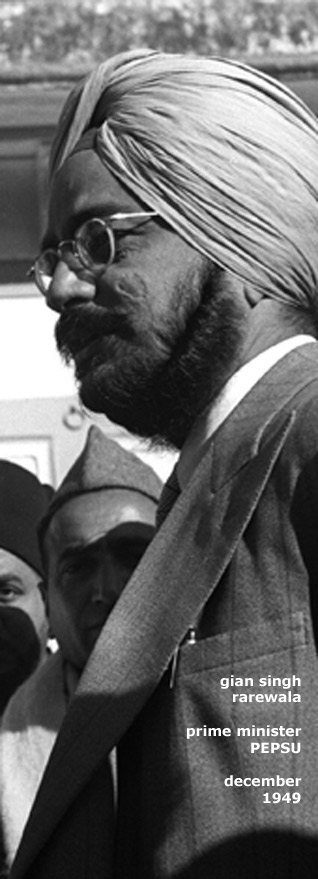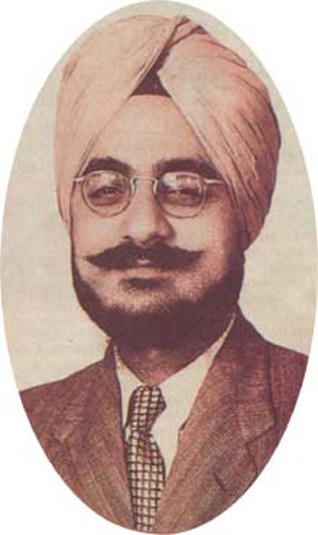History
Gentleman - Aristocrat:
Gian Singh Rarewala
ROOPINDER SINGH
Gian Singh Rarewala [pronounced ‘raarrey-waala’] has left a lasting impression on the entire region of Greater Punjab.
Soft-spoken and suave, his was a multi-faceted personality. We still feel the beneficial effects of the decisions taken by a man who was born well over a century ago.
What most people remember about him is that he was ever able to relate to a wide spectrum of society despite his aristocratic upbringing.
Born on December 16, 1901, in the Rara village, a descendant of Ratan Singh Bhangu, the author of Panth Prakash, Gian Singh studied in Patiala, graduated from Mahindra College, and joined the judicial service of the Sikh Kingdom of Patiala.
He soon rose to become a judge of the Patiala State High Court. He also served as a Revenue Commissioner and then Revenue Minister of the state and was Prime Minister of Patiala during the most crucial period -- 1946-47 -- and was both Prime Minister and Chief Minister of Pepsu (Patiala and East Punjab States Union) et al.
More than the positions he held, his most significant contribution was the crucial role he played in raising the status of Punjabi as a language.
During his tenure as Deputy Commissioner, Patiala, and President of the Singh Sabha, in 1944, he invited Maharaja Yadavindra Singh to the Singh Sabha and requested him to adopt Punjabi as the official language of the state.
The Maharaja declared that he would do so, and Gian Singh took a scant 10 months preparation to make Punjabi a state language. He made it the medium of instruction, the administrative language, and the judicial language along with English. This proved to be the beginning that allowed more work to be done in promoting Punjabi.
Even as Prime Minister of Pepsu, Gian Singh kept the department of Punjabi under his charge. Being in-charge of Finance, he presented the Pepsu Budget of 1948-49 and 1949-50 in Punjabi. It was distributed on cyclostyled sheets because it could not be printed properly at that time. More than 600 new terms were coined in Punjabi for the Budget.
As much as Rs 300,000 -- a princely sum then -- were allocated to the Punjabi Department to develop and print textbooks and other necessary publications. An order of Rs 100,000 was placed with the Remington typewriter company to develop and deliver Punjabi typewriters. Special efforts were made to introduce Punjabi stenography for official use. Instructions were sent out to use Punjabi as the official language of communications in all state departments.
This zeal for developing and spreading Punjabi had become a passion of his life. Gian Singh came up with the principle of geographical contiguity for determining the language of the area rather than religion through a circular of the Education Department on August 24, 1949.
This is what we call the Pepsu Formula, seen as a precursor of the Regional Formula adopted later.
Gian Singh implemented the Pepsu Formula with the active support of the then Deputy Prime Minister Vallabhbhai Patel and Secretary of States, V. P. Menon, which precluded any kind of opposition or ill-conceived agitation that so bedevilled the implementation of Punjabi as the state language in Punjab.
On July 15, 1948, Pepsu was formed. It was headed by Maharaja Yadavindra Singh, who was the Rajpramukh and Maharaja Jagatjit Singh of Kapurthala, who was the Deputy Rajpramukh. Pepsu itself comprised the then princely states of Patiala, Nabha, Kapurthala, Faridkot, Jind, Malerkotla, Nalagarh and Kalsia. The hilly areas of Kasauli, Kandaghat, Dharampur and Chail were also part of Pepsu.
Gian Singh served as Pepsu’s Premier from November, 1949, to May 1951. This was while he was still in the service of Patiala state. Later, he joined active politics and contested in the 1951 polls. He was elected to the Pepsu Assembly from Payal constituency as an independent candidate. Heading the United Front Ministry, he became the first non-Congress Chief Minister of any Indian state and also played a significant role in the successful experiment in coalition politics.
He was Chief Minister of Pepsu from April, 1952, to March, 1953, when President’s rule was imposed and his government was dismissed. During this time, he showed his mettle by providing leadership, political as well as administrative, to the people, though a non-Congress government was obviously an irritant to the Centre.
Following midterm polls, he could not form a government and became the Leader of Opposition in 1954.
Gian Singh had been nominated member of the Shiromani Gurdwara Parbandhak Committee (SGPC) for a while. He became President of the SGPC in 1955.
During the time, a morcha for Punjabi Suba was observed as a protest against the entry of police personnel into the Golden Temple complex and most of the Akali leaders had courted arrest. He, too, had gone to court arrest, though his presence acted as a catalyst and the government gave in to the demands of the protesters and lifted the orders banning assembly of people and holding protest meetings. In 1956, he and five others, including Master Tara Singh, signed an agreement with Jawaharlal Nehru, giving birth to the Regional Formula (of giving weightage to the language spoken in a region).
After the merger of Pepsu with Punjab, the man who had resisted various inducements to join the Congress, became its member in 1956. He was elected to the Punjab Assembly in 1957 on a Congress ticket. He became Irrigation Minister in the Partap Singh Kairon Cabinet.
Gian Singh was elected to the state Assembly in 1962 but was not inducted in the Kairon Cabinet. He won the 1967 election too. He left the Congress (reportedly because of differences with Morarji Desai) and joined the Akali Dal in 1969, an association which he continued till his death on December 31, 1979.
Besides his contribution to the Punjabi language, Gian Singh is also remembered for the crucial role he played as Deputy Commissioner, Patiala, in building a new complex for Gurdwara Dukh Nivaran in Patiala, which reportedly earned him the wrath of the powers that be who transferred him to Narnaul, then a back-of-beyond place, where too he proved to be an effective administrator.
He was also a representative of Patiala in the Constituent Assembly of India which he joined on April 28, 1947. It was during this time that a lot was happening in the region and Gian Singh was in the thick of it, especially in rehabilitating refugees in Patiala. In this he was ably assisted by his wife Manmohan Kaur as well as a band of dedicated volunteers from various aristocratic families and citizenry and the state machinery.
Among the people he worked closely with were Giani Gurdit Singh, President Guru Granth Vidya Kendra, Raja Narinder Singh, Health Minister, Punjab, and Tarlochan Singh, Vice-Chairman, Minorities Commission. He made Patiala the host of many prominent migrants, especially educationists, whom he actively sought and helped. They included Principal Teja Singh, Prof. Ganda Singh historian, Baba Prem Singh Hotimardan, Dr Benarsi Das, Pandit Kartar Singh Dakha and Kirpal Singh Bedar. All were given homes and honourable positions in Patiala.
For many the role that he played in planning a Punjabi university and setting up Punjab Agriculture University, Ludhiana, is memorable. For others, it is building a team of eminent people including Justice Teja Singh, Chief Justice; Sardar Bahadur Mohan Singh Rawalpindi, Chairman, Public Service Commission; Mohan Singh, Managing Director, Bank of Patiala; and Baldev Singh, Deputy Commissioner, Patiala (he was Maneka Gandhi’s grandfather) who all contributed to the development of the region.
Gian Singh Rarewala left an impact no matter where he was. Many contemporaries even recall his sartorial elegance and handsome demeanour.
He spent the first 26 years of his life in an aristocratic environment, enjoying life and studying. He was an administrator for 20 years. He spent the next two decades in politics; he served as Chief Minister of Pepsu, as Irrigation as well as Power Minister.
The final 12 years of his life were spent in retirement. Most of this time he lived with his daughter, Nirlep Kaur, who had also been active in politics and had been a Member of Parliament.
He was always the epitome of a gentleman-aristocrat, whose administrative skills and integrity are still remembered.
[Courtesy: Tribune. Edited for sikhchic.com]
August 10, 2013
Conversation about this article
1: Raj (Canada), August 10, 2013, 7:00 PM.
Impressive resume, with one big flaw, I have mentioned it before on this site: it was the absence of a long-term vision by leaders of all sections of Sikh society, royal, political, social, economical etc. The declaration of the formation of PEPSU state should have been announced at least five years before they realized its necessity. They are all responsible for the mess our current and the future generations of Sikhs have been thrown into. It will be only a miracle if we can salvage our identity for the generations to come.
2: Bhai Harbans Lal (Dallas, Texas, USA), August 10, 2013, 9:50 PM.
Roopinder ji, you brought many memories afresh to mind. Sardar Gian Singh Rarewala deserves our recognition; we cannot forget his contributions at a difficult time of our history. He always looked for opportunities to promote long term Sikh causes even though he could not do certain things publically because of his political role. He was friendly to the objectives of the All India Sikh Students Federation. I met him more than once both in his office and in his home, so did other members of the AISSF leadership. When he found out that I was planning to leave Punjab to move to Bombay in preparation for going abroad for higher education, he showed his concern that Punjab may lose me forever. He called me in his office and asked for Sardar Dara Singh, his Health Minister, to be present. He asked Sardar Dara Singh if he could find or create a job for me in PEPSU. The answer was yes. We discussed various possibilities including the position of the State Drug Inspector. I was adamant on leaving Punjab to avoid my getting too deep in Punjab party politics. I always remembered the advice of Professor Sahib Singh and Sardar Sarup Singh that neither Sardar Satbir Singh nor I should ever take any political office in Punjab. Sardar Gian Singh Rarewala respected my wish as he always respected me even though I was only a young chap. I do not recall the exact year but I remember him honoring me at a conference by presenting the Sri Sahib to me. It could be a Sikh Educational Conference. Whenever I remember him, I feel humble. His daughter Nirlep Kaur ji continued to respect my relationship with her father.




